Story Time With Nick Willis: I'm Still Improving
Story Time With Nick Willis: I'm Still Improving
We talked to Nick Willis on the latest, ON THE RUN podcast about working out in Michigan, the Very Nice Track Club and Ron Warhurst's legendary tattoo. Plus
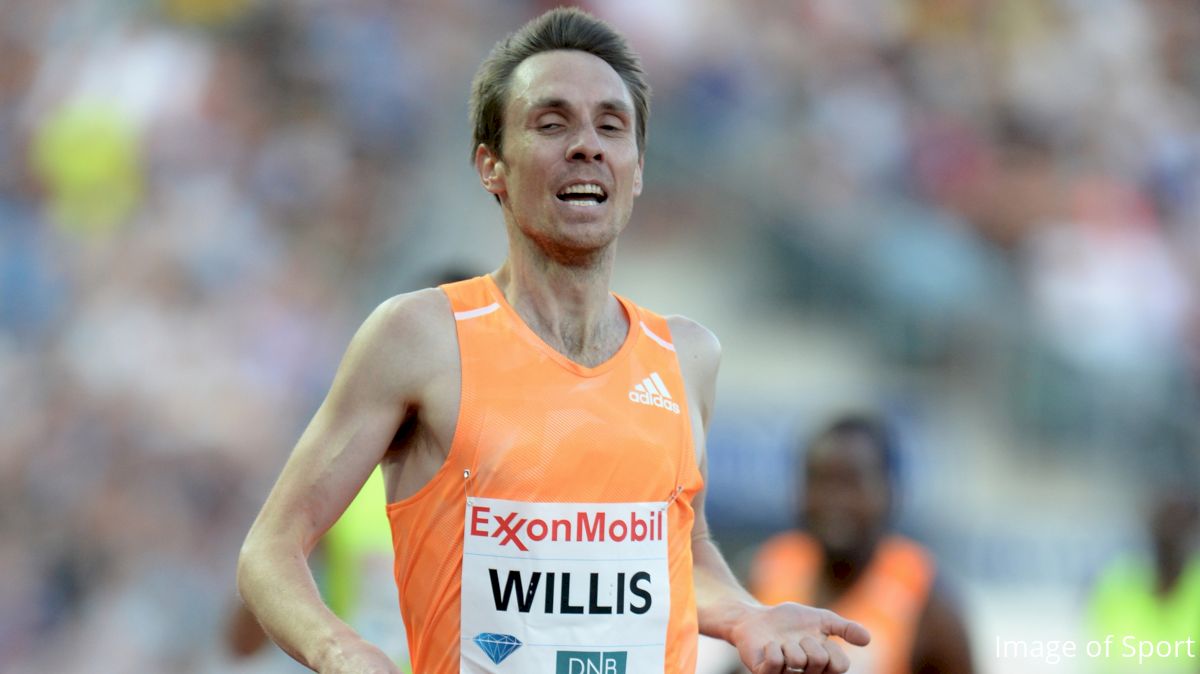
We talked to Nick Willis on the latest, ON THE RUN podcast about working out in Michigan, the Very Nice Track Club and Ron Warhurst's legendary tattoo. Plus, his recent pacing duties, getting kicked out of a Michigan football game and being told he is old at age 33.
NW: Yesterday it was blazing hot down at the track, even though it makes your recovery a lot harder. I definitely notice the benefits to the muscles, just the pace of the workout. We did a Michigan yesterday. The speeds were a lot easier just because your muscles are a lot more warmed up.
FT: Did you tweet out that was one of your best Michigans ever?
NW: Yeah, I mean, there’s one perhaps that was equally as good but I was trying to think, does that mean that I'm in good shape or not? Because I was trying to reflect back what that work out, what that was right before, and then I looked back in my logs that don’t exist, I had to go back into my mind and memory.
It was 10 or 12 days before I ran my first ever sub 3:30 so that’s a good sign.
Doesn’t mean that I’m in that shape yet because Michigans are a lot more strength-based than speed, but I was stoked to grind through a 1:57 800 in the middle of a Michigan, that’s not only the hardest of all of the reps, the 800 meter one, so really try and push that one hard.
FT: Share your splits with us?
NW: Yeah so you start off on the track, oddly enough we start at the steeplechase area that’s always been the water jumper halfway around the last bend, we start there and we run a mile on the track or 1,600 and we ran a 4:20.
The whole Very Nice Track Club group was there.
Then you jogged 250 meters out onto the outside of the parking lot until we hit our road loop which goes up around The Big House, the Michigan football stadium. And that’s a 2.1K loop. It’s got a hell of a hill and back up around the football stadium and down.
We averaged 4:55 mile pace for that loop and come back to the track.
Now the 250-meter jog and then a 1,200 meters around 3:11 and then do another loop again on the road loop, 4:55 pace 2K, and then the 800 is what I was talking about, I really try and get as close to 2 minutes as possible and I came through in 58. I said no point in slowing down now so I just kept it going and ran a 1:57 and I was stuffed by then.
All the other guys hung back and ran like a 2:05 or 2:10 so they were breathing OK going into the last road loop and I was just totally stuffed. Like the work out might as well have finished there. I hung back 20 or 30 meters off of them for the first half of the final road loop up the hill and then I caught them again on the downhill.
There’s like a long 200-meter downhill, just slowly catch up to them again. Then when you get back to the track -- and in track season we stop and put spikes on at that point. Normally in the fall, in or in the winter we’ll just keep our flats on but on track season we put on spikes, get a little bit more rest, and get the faster footwear on and got ready to run an all-you-got 400 -- AUG as Coach Ron Warhurst says.
You try and wind it up, not go all out from the gun, but finish as hard as you can.
I just broke 52 seconds, 51.8 I think I got, so yeah it was a good day at the office and my sort of final, last hard work out.
Helping Fellow New Zealand Runners
FT: You've paced a lot of guys in some big races lately, did I read somewhere that you are tired of being only Kiwi on starting line?
NW: Yeah I mean there’s many, many reasons why I want to but ultimately I wouldn't’ do it if it compromised my Olympic campaign.
All athletes look out for number one by and large but there are many ways of doing it this isn’t a unique situation and my season just probably a little bit more publicized because the guys are running so well.
But normally I will choose to open up seasons either it be the end of season down in New Zealand with their summer or here some of the smaller meets. I like to open up on pace making. So you get the environment of warming up for a race, having to start, hold the gun up, on your marks gentlemen, all that sort of stuff. But because you’re not finishing you don’t have the accountability of the stopwatch so there’s analyzing every split second of your time so it means that you can afford to keep your training volume high that week.
I can't’ afford early in the season to drop into the 70s or 60s miles per week. I’ve got to keep it in the 80s or 90s so by pacing it allows me to still train hard but still get that race experience.
It helps me up my game, I wouldn't’ have been able to do all those splits and training well on my own.
But at the same time I'm a fan of the sport, I've been involved in the sport since I was 5 years old way before I ever became world class as an athlete and so just like all my fellow New Zealanders at home wanting to see these guys qualify, I really want to see them do it. I’m a fan of the sport, I just happen to have the ability to influence the outcome of it a little bit more.
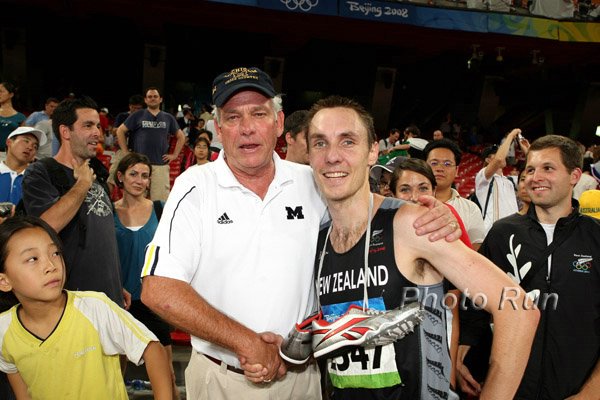 NW: It’s a very loosely formed affiliation.
NW: It’s a very loosely formed affiliation.
In fact, very few of us are actually ever around after anyone’s particular time. It’s not really a geographically based club.
It’s more just anyone who has affiliations with Ron Warhurst, not many people know this but back in the day when Ron was at the NCAA championships in New Orleans he got a dare to get a tattoo so one night late after the meet had finished he got a tattoo on his right rectum, on his glute, and he got a, “very nice” was written on it so that’s kind of how it formed and ever since then, because he says, he yells very nice as we’re running along in workouts and races you know.
So that’s how it’s happened and Will Leer and I have continued training together even though he lived on the west coast of the last four years so we do a lot of the same training but over email.
So I'll do it three hours before him and he attempts to chase my times and then it’s just sort of grown from there with some of the local guys here and we get together for training camps and stuff so there’s not really a formalized location.
FT: So do you need a "Very Nice" tattoo to be in the track club?
NW: No none of us. Ron is the only one. He eventually showed it on national television in New Zealand to the cameras. He dropped the right cheek.
NW: Yeah, sort of an interesting thing. You’ve got the savior of the world coming to Ann Arbor and it’s the greatest thing since sliced bread.
He really has made an incredible difference but at the same time I'm not a football player I'm a track guy so sure I'm a good fan of the sport but a small part of you gets a little bit of guilty satisfaction when the football team really struggles because it’s like, stop giving them all of the attention, see they’re not always the world’s greatest thing since sliced bread.
I’ve had a bit of back and forth with the football program over the years. Interesting story back in 2004, Tim Broe and I were asked people who had gone to the Olympics to be honored after the first quarter of the football game, to be honored out on the middle of the field with all the other Olympians connected to Michigan.
So Michael Phelps and all the other athletes, there were probably 30 of us there. So we’re waiting down on the field, we’re like behind the end zone of the first quarter and then they bring us out and then we waved to the crowd and everyone cheers and stuff and then when after that’s over they come up to us and they said, where are your passes, where are your tickets?
We don’t have tickets.
So security escorts us out of the stadium because we’re not supposed to be in there.
So then when four years later when it happened when they asked us, I said I don't’ want to do that again, you treated us terribly last time. So that was the moment so I told my coach that so he made them right their wrongs so now every invite gets taken up to the corporate boxes and they get given two tickets, one for their guest as well.
So they’re treated rather royally now.
FT: That’s terrible!
NW: We have a photo of us being taken out into the parking lot. Out of the tunnel.
I try to choke it down. That was before digital cameras or Twitter so I'll have to find the real copy. Most of your listeners probably weren’t alive in 2004.
NW: You wouldn’t have seen me in that video, just Alan out by 50 meters the whole way
That was my sophomore year in college at Michigan and I was redshirting along with Nick Brannen, who was also at Michigan with me. We redshirted that outdoor season hoping to hit our qualifying times and so as I mentioned earlier I’d run 3:36.24 at the Portland Adidas Grand Prix.
So yeah it’s inevitable that I’d get my get my qualifying time but the next race was the Pre Classic and I was hoping to try and run the 1500 meter split as part of the mile and I heard, then Alan asked for 1:53 through the 800.
He always liked to run positive splits for the mile, which I hate doing and so he asked for 1:50 trying to break 1:53 so his goal is 1:50 and then 1:58 or something as his two-way of doing it. So I just hoped, but our field as a lot weaker than it is now, they didn’t bring over as many Kenyans, I think there was only one Kenyan in the race.
And so we did a 1:59 through the 80 our group and so I took off with 500 meters to go to try and catch him and I think I ran a 3:50 three-mile and I was 3:38 so I was way off the qualifying time.
NW: It’s something I'm quite interested in.
Obviously I'm 33, I've just turned 33 last month, and yet I'm still doing workouts and training to the best of my career so people keep telling me, well what are you going to do when your career over’s and I was always sort of held back by that mentality I think when I was 30, 31, well I guess I've only got a couple of years left.
But I'm still improving.
So I thought, screw it I'm not going to worry about that mindset anymore, there is no precedent for what is the right age when you’re supposed to start declining. So I don’t know what the science is sort of behind but the Robertson twins, Jake and Zane, they live in Kenya, they remind me all of the time, they say, Nick, you’re young, you’re not old, all of your Kenyan competitors are actually older than you, the guys are actually eight, nine, 10, 11, 12 years older than what they state on their ages.
And so that’s their sort of encouragement to me to say don't’ believe in this mindset that you have to retire when you're 30.
So I guess I’ll pose it to you before I give my theories but why do you think that the status, the underlying thought is that mid 20s is the peak age for middle distance runners?
FT: Because there are different economic pressures on young adults in East Africa than here in the Western World...
NW: There’s pressure for them to support their families but what is the, if you’re a guy who’s already making a little bit of money running what is the best way to try and support your family?
It’s most likely to stay in the sport of running because the opportunity, there aren’t many other alternative options for people in developing nations.
I’ve had so many friends, like these three guys that I've been trying to help qualify for the Olympics. For example, one of them just so he can have flexibility with his training he works on a like a factory line canning fruit back in New Zealand so he works 30 hours a week doing that. He’s got an economics degree from Stony Brook University.
Another guy is halfway through his MBA and another guy wants to become a professor of botany.
While they’re still improving their running, but they’re 27, they’re not able to really commit to serious relationships with their significant others because it’s like how can I get married if I'm basically losing money running?
I’m probably spending $20,000 a year of their own cash to support this dream of theirs to go to the Olympics. So unless they really pick up a significant sponsor, then the writing's on the wall for their running careers and yet they’re still improving.
I was one of the fortunate few who got a great assistance right out of college when I signed my original deal with Reebok out of Michigan and then since then the longer I’ve been in the sport it’s almost like my alternatives becoming less and less in the corporate world because I don't’ want to go into an entry level job in finance as a 33 years old now.
So I'm actually better off financially keeping running while staying within the sport of running to make my living because it’s going to take me a couple of years to build up any sort of real income stream anyways. So I'm actually incentivized to keep running.
FT: What advice do you have for runners in their late 20's who haven't quite found fortunate economic status?
NW: I’m not necessarily sure I have a huge amount of advice but I would say if it really is a passion of yours and are willing to continually make sacrifices, know that it’s not in vain, like it’s not something that you’re not likely to improve.
I do genuinely believe that if you haven’t overdone it in your training, you can obviously certain types of athletes who have been able to keep going and have just got nothing left and guys like Alan Webb and Chris Solinsky and Craig Mottram, those guys they got every single bit out of themselves because the amount they train was probably three times whatever I've been able to handle. But it also means they’ll probably suffer a little bit of burnout at the end of their careers as well.
So I would encourage people to say, maybe work a couple of years and keep training while you’re doing it and then when you get to that point and you can take sort of a leave of absence to focus on your running again, it doesn’t always have to be all or nothing sort of thing. But once your heart’s out of it, if you’re only got one foot in the door it’s really hard to really keep doing it with the same fire or passion that you were beforehand.
And that’s what was affecting me after the London Olympics.
I started thinking, well, maybe it’s time to start thinking about my alternative careers outside of the sport of running and I had a foot out the door for about six months and it just made it really difficult to be motivated for my running.
But once I decided no, I'm going to stick to running again, it was like I turned my back to the corporate world and it was all or nothing. Well there’s no turning back now, baby, so let’s give it everything I've got and I think you'll see the results from that and my enjoyment of the sport as well.
Working Out in Michigan
NW: Yesterday it was blazing hot down at the track, even though it makes your recovery a lot harder. I definitely notice the benefits to the muscles, just the pace of the workout. We did a Michigan yesterday. The speeds were a lot easier just because your muscles are a lot more warmed up.
FT: Did you tweet out that was one of your best Michigans ever?
NW: Yeah, I mean, there’s one perhaps that was equally as good but I was trying to think, does that mean that I'm in good shape or not? Because I was trying to reflect back what that work out, what that was right before, and then I looked back in my logs that don’t exist, I had to go back into my mind and memory.
It was 10 or 12 days before I ran my first ever sub 3:30 so that’s a good sign.
Doesn’t mean that I’m in that shape yet because Michigans are a lot more strength-based than speed, but I was stoked to grind through a 1:57 800 in the middle of a Michigan, that’s not only the hardest of all of the reps, the 800 meter one, so really try and push that one hard.
FT: Share your splits with us?
NW: Yeah so you start off on the track, oddly enough we start at the steeplechase area that’s always been the water jumper halfway around the last bend, we start there and we run a mile on the track or 1,600 and we ran a 4:20.
The whole Very Nice Track Club group was there.
Then you jogged 250 meters out onto the outside of the parking lot until we hit our road loop which goes up around The Big House, the Michigan football stadium. And that’s a 2.1K loop. It’s got a hell of a hill and back up around the football stadium and down.
We averaged 4:55 mile pace for that loop and come back to the track.
Now the 250-meter jog and then a 1,200 meters around 3:11 and then do another loop again on the road loop, 4:55 pace 2K, and then the 800 is what I was talking about, I really try and get as close to 2 minutes as possible and I came through in 58. I said no point in slowing down now so I just kept it going and ran a 1:57 and I was stuffed by then.
All the other guys hung back and ran like a 2:05 or 2:10 so they were breathing OK going into the last road loop and I was just totally stuffed. Like the work out might as well have finished there. I hung back 20 or 30 meters off of them for the first half of the final road loop up the hill and then I caught them again on the downhill.
There’s like a long 200-meter downhill, just slowly catch up to them again. Then when you get back to the track -- and in track season we stop and put spikes on at that point. Normally in the fall, in or in the winter we’ll just keep our flats on but on track season we put on spikes, get a little bit more rest, and get the faster footwear on and got ready to run an all-you-got 400 -- AUG as Coach Ron Warhurst says.
You try and wind it up, not go all out from the gun, but finish as hard as you can.
I just broke 52 seconds, 51.8 I think I got, so yeah it was a good day at the office and my sort of final, last hard work out.
Helping Fellow New Zealand Runners
FT: You've paced a lot of guys in some big races lately, did I read somewhere that you are tired of being only Kiwi on starting line?
NW: Yeah I mean there’s many, many reasons why I want to but ultimately I wouldn't’ do it if it compromised my Olympic campaign.
All athletes look out for number one by and large but there are many ways of doing it this isn’t a unique situation and my season just probably a little bit more publicized because the guys are running so well.
But normally I will choose to open up seasons either it be the end of season down in New Zealand with their summer or here some of the smaller meets. I like to open up on pace making. So you get the environment of warming up for a race, having to start, hold the gun up, on your marks gentlemen, all that sort of stuff. But because you’re not finishing you don’t have the accountability of the stopwatch so there’s analyzing every split second of your time so it means that you can afford to keep your training volume high that week.
I can't’ afford early in the season to drop into the 70s or 60s miles per week. I’ve got to keep it in the 80s or 90s so by pacing it allows me to still train hard but still get that race experience.
It helps me up my game, I wouldn't’ have been able to do all those splits and training well on my own.
But at the same time I'm a fan of the sport, I've been involved in the sport since I was 5 years old way before I ever became world class as an athlete and so just like all my fellow New Zealanders at home wanting to see these guys qualify, I really want to see them do it. I’m a fan of the sport, I just happen to have the ability to influence the outcome of it a little bit more.
Ron Warhurst's Tattoo & Very Nice Track Club
 NW: It’s a very loosely formed affiliation.
NW: It’s a very loosely formed affiliation. In fact, very few of us are actually ever around after anyone’s particular time. It’s not really a geographically based club.
It’s more just anyone who has affiliations with Ron Warhurst, not many people know this but back in the day when Ron was at the NCAA championships in New Orleans he got a dare to get a tattoo so one night late after the meet had finished he got a tattoo on his right rectum, on his glute, and he got a, “very nice” was written on it so that’s kind of how it formed and ever since then, because he says, he yells very nice as we’re running along in workouts and races you know.
So that’s how it’s happened and Will Leer and I have continued training together even though he lived on the west coast of the last four years so we do a lot of the same training but over email.
So I'll do it three hours before him and he attempts to chase my times and then it’s just sort of grown from there with some of the local guys here and we get together for training camps and stuff so there’s not really a formalized location.
FT: So do you need a "Very Nice" tattoo to be in the track club?
NW: No none of us. Ron is the only one. He eventually showed it on national television in New Zealand to the cameras. He dropped the right cheek.
Michigan Football
NW: Yeah, sort of an interesting thing. You’ve got the savior of the world coming to Ann Arbor and it’s the greatest thing since sliced bread.
He really has made an incredible difference but at the same time I'm not a football player I'm a track guy so sure I'm a good fan of the sport but a small part of you gets a little bit of guilty satisfaction when the football team really struggles because it’s like, stop giving them all of the attention, see they’re not always the world’s greatest thing since sliced bread.
I’ve had a bit of back and forth with the football program over the years. Interesting story back in 2004, Tim Broe and I were asked people who had gone to the Olympics to be honored after the first quarter of the football game, to be honored out on the middle of the field with all the other Olympians connected to Michigan.
So Michael Phelps and all the other athletes, there were probably 30 of us there. So we’re waiting down on the field, we’re like behind the end zone of the first quarter and then they bring us out and then we waved to the crowd and everyone cheers and stuff and then when after that’s over they come up to us and they said, where are your passes, where are your tickets?
We don’t have tickets.
So security escorts us out of the stadium because we’re not supposed to be in there.
So then when four years later when it happened when they asked us, I said I don't’ want to do that again, you treated us terribly last time. So that was the moment so I told my coach that so he made them right their wrongs so now every invite gets taken up to the corporate boxes and they get given two tickets, one for their guest as well.
So they’re treated rather royally now.
FT: That’s terrible!
NW: We have a photo of us being taken out into the parking lot. Out of the tunnel.
I try to choke it down. That was before digital cameras or Twitter so I'll have to find the real copy. Most of your listeners probably weren’t alive in 2004.
The 2004 Bowerman Mile
NW: You wouldn’t have seen me in that video, just Alan out by 50 meters the whole way
That was my sophomore year in college at Michigan and I was redshirting along with Nick Brannen, who was also at Michigan with me. We redshirted that outdoor season hoping to hit our qualifying times and so as I mentioned earlier I’d run 3:36.24 at the Portland Adidas Grand Prix.
So yeah it’s inevitable that I’d get my get my qualifying time but the next race was the Pre Classic and I was hoping to try and run the 1500 meter split as part of the mile and I heard, then Alan asked for 1:53 through the 800.
He always liked to run positive splits for the mile, which I hate doing and so he asked for 1:50 trying to break 1:53 so his goal is 1:50 and then 1:58 or something as his two-way of doing it. So I just hoped, but our field as a lot weaker than it is now, they didn’t bring over as many Kenyans, I think there was only one Kenyan in the race.
And so we did a 1:59 through the 80 our group and so I took off with 500 meters to go to try and catch him and I think I ran a 3:50 three-mile and I was 3:38 so I was way off the qualifying time.
Ageism in Track and Field
NW: It’s something I'm quite interested in.
Obviously I'm 33, I've just turned 33 last month, and yet I'm still doing workouts and training to the best of my career so people keep telling me, well what are you going to do when your career over’s and I was always sort of held back by that mentality I think when I was 30, 31, well I guess I've only got a couple of years left.
But I'm still improving.
So I thought, screw it I'm not going to worry about that mindset anymore, there is no precedent for what is the right age when you’re supposed to start declining. So I don’t know what the science is sort of behind but the Robertson twins, Jake and Zane, they live in Kenya, they remind me all of the time, they say, Nick, you’re young, you’re not old, all of your Kenyan competitors are actually older than you, the guys are actually eight, nine, 10, 11, 12 years older than what they state on their ages.
And so that’s their sort of encouragement to me to say don't’ believe in this mindset that you have to retire when you're 30.
So I guess I’ll pose it to you before I give my theories but why do you think that the status, the underlying thought is that mid 20s is the peak age for middle distance runners?
FT: Because there are different economic pressures on young adults in East Africa than here in the Western World...
NW: There’s pressure for them to support their families but what is the, if you’re a guy who’s already making a little bit of money running what is the best way to try and support your family?
It’s most likely to stay in the sport of running because the opportunity, there aren’t many other alternative options for people in developing nations.
I’ve had so many friends, like these three guys that I've been trying to help qualify for the Olympics. For example, one of them just so he can have flexibility with his training he works on a like a factory line canning fruit back in New Zealand so he works 30 hours a week doing that. He’s got an economics degree from Stony Brook University.
Another guy is halfway through his MBA and another guy wants to become a professor of botany.
While they’re still improving their running, but they’re 27, they’re not able to really commit to serious relationships with their significant others because it’s like how can I get married if I'm basically losing money running?
I’m probably spending $20,000 a year of their own cash to support this dream of theirs to go to the Olympics. So unless they really pick up a significant sponsor, then the writing's on the wall for their running careers and yet they’re still improving.
I was one of the fortunate few who got a great assistance right out of college when I signed my original deal with Reebok out of Michigan and then since then the longer I’ve been in the sport it’s almost like my alternatives becoming less and less in the corporate world because I don't’ want to go into an entry level job in finance as a 33 years old now.
So I'm actually better off financially keeping running while staying within the sport of running to make my living because it’s going to take me a couple of years to build up any sort of real income stream anyways. So I'm actually incentivized to keep running.
FT: What advice do you have for runners in their late 20's who haven't quite found fortunate economic status?
NW: I’m not necessarily sure I have a huge amount of advice but I would say if it really is a passion of yours and are willing to continually make sacrifices, know that it’s not in vain, like it’s not something that you’re not likely to improve.
I do genuinely believe that if you haven’t overdone it in your training, you can obviously certain types of athletes who have been able to keep going and have just got nothing left and guys like Alan Webb and Chris Solinsky and Craig Mottram, those guys they got every single bit out of themselves because the amount they train was probably three times whatever I've been able to handle. But it also means they’ll probably suffer a little bit of burnout at the end of their careers as well.
So I would encourage people to say, maybe work a couple of years and keep training while you’re doing it and then when you get to that point and you can take sort of a leave of absence to focus on your running again, it doesn’t always have to be all or nothing sort of thing. But once your heart’s out of it, if you’re only got one foot in the door it’s really hard to really keep doing it with the same fire or passion that you were beforehand.
And that’s what was affecting me after the London Olympics.
I started thinking, well, maybe it’s time to start thinking about my alternative careers outside of the sport of running and I had a foot out the door for about six months and it just made it really difficult to be motivated for my running.
But once I decided no, I'm going to stick to running again, it was like I turned my back to the corporate world and it was all or nothing. Well there’s no turning back now, baby, so let’s give it everything I've got and I think you'll see the results from that and my enjoyment of the sport as well.
Related Content
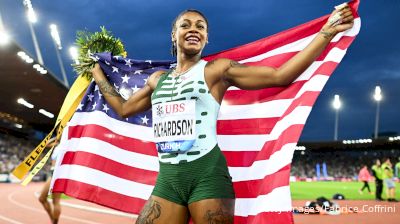 Diamond League Xiamen 2024 To Include USA Track Star Sha'Carri Richardson
Diamond League Xiamen 2024 To Include USA Track Star Sha'Carri RichardsonApr 19, 2024
 Marathon Master's World Record-Holder Kenenisa Bekele Excited For Return To London Marathon
Marathon Master's World Record-Holder Kenenisa Bekele Excited For Return To London MarathonApr 19, 2024
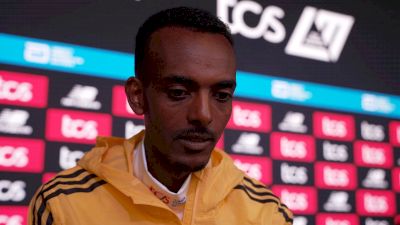 Tamirat Tola Is Confident In His Training Heading Into London Marathon
Tamirat Tola Is Confident In His Training Heading Into London MarathonApr 19, 2024
 Leul Gebresilase Prepared For 2024 TCS London Marathon
Leul Gebresilase Prepared For 2024 TCS London MarathonApr 19, 2024
 Mic'd Up With Ritz At The TEN
Mic'd Up With Ritz At The TENApr 19, 2024
 FloSports Recognized Globally By International Sports Press Association
FloSports Recognized Globally By International Sports Press AssociationApr 18, 2024
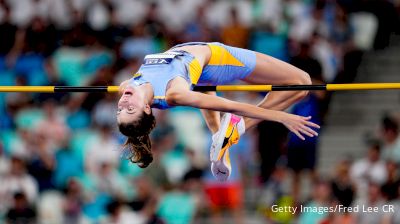 How To Watch The Diamond League Xiamen 2024
How To Watch The Diamond League Xiamen 2024Apr 18, 2024
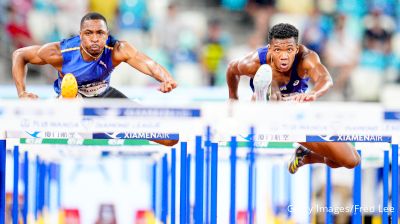 Diamond League Xiamen 2024 Schedule: What To Know
Diamond League Xiamen 2024 Schedule: What To KnowApr 18, 2024
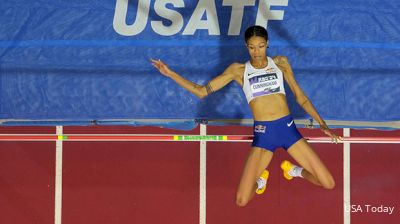 Vashti Cunningham Highlights Olympic Development High Jump Fields At Penn
Vashti Cunningham Highlights Olympic Development High Jump Fields At PennApr 18, 2024